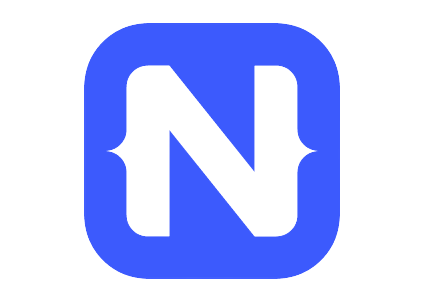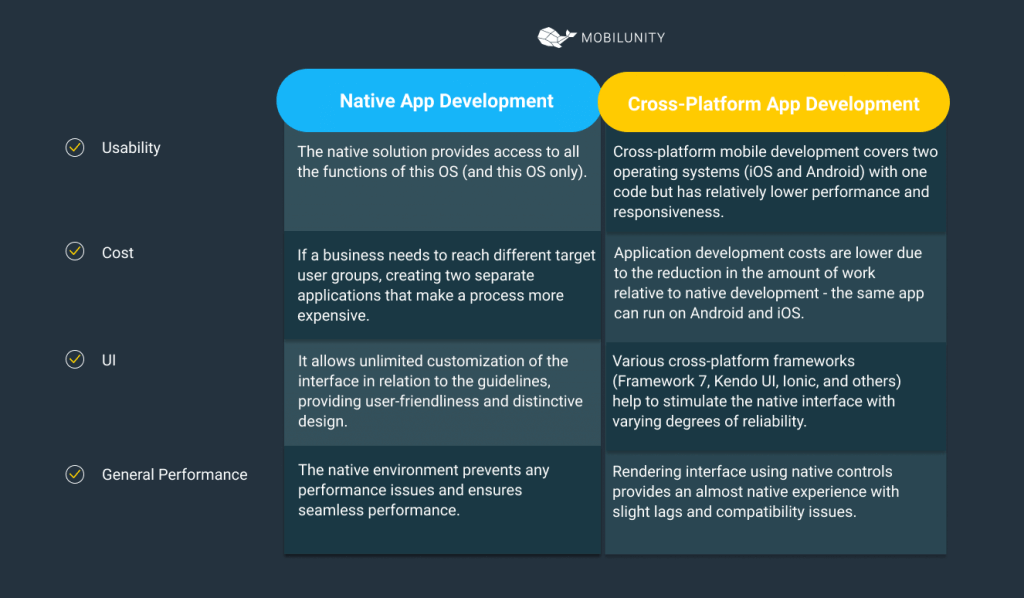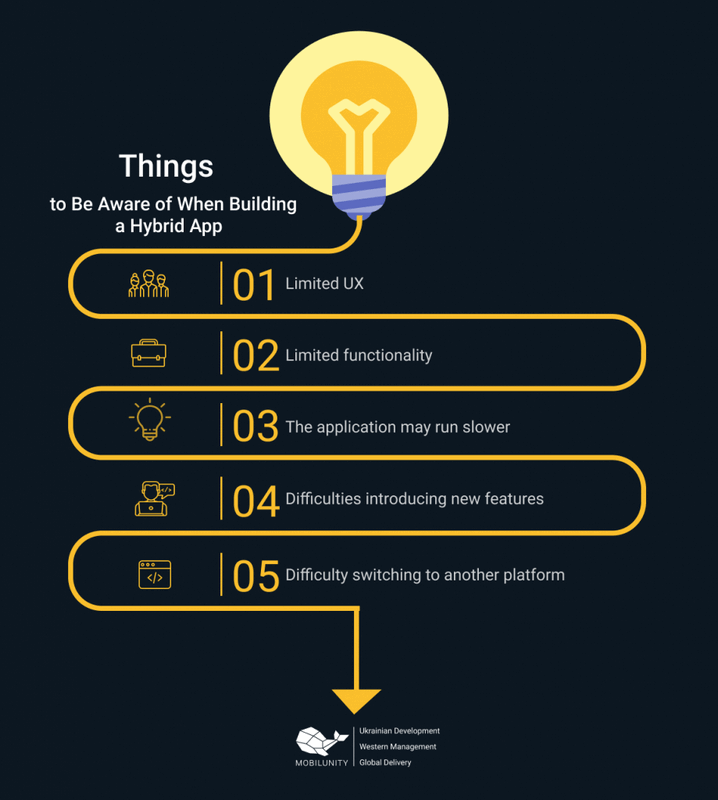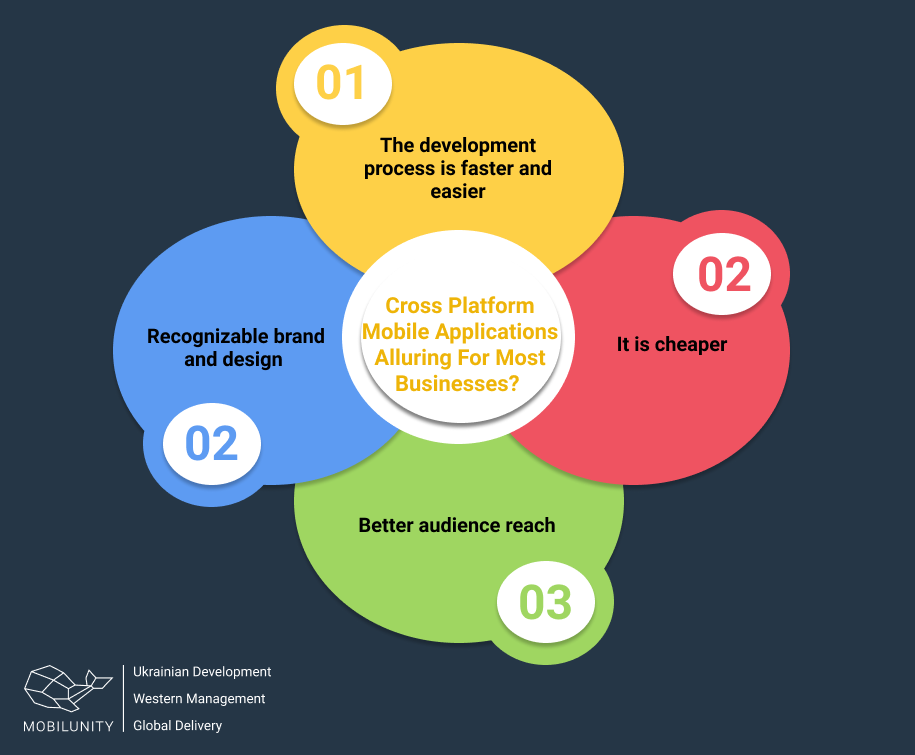How to Benefit From Building Cross Platform Mobile Apps

- Understanding Cross Platform Mobile App Development Services
- Most Popular Multi Platform Mobile Application Development Frameworks
- Native vs Cross Platform Mobile Development: What to Choose?
- Things to Be Aware of When Building a Hybrid App
- Why Are Cross Platform Mobile Applications Alluring For Most Businesses?
- What Are Cross Platform Mobile Developer Main Duties?
- FAQ about Hybrid Mobile Development
- Top-Notch Cross-Platform Mobile Development with Mobilunity
The ability to forecast the customers’ needs and wishes and provide them with the most accessible and handy solutions was always the key to any business’ success. According to TechCrunch, the average time that customers spend on apps reaches 4.2 hours per day in the first quarter of 2021. This caused even the businesses that haven’t embraced mobile solutions yet to quickly switch their focus to mobile apps.
Due to harsh competition, all apps are continuously getting new features, updates, and attention-grabbing designs. Besides, users are becoming more selective and demanding about the technologies they use. With continuous feature updates and device upgrades, optimizing and coding new applications for two various platforms becomes more challenging.
That is why, in contrast to native programming languages, multi-platform or hybrid solutions have emerged, helping a company create an accessible application for various end devices at the same time without having to build a separate app for each environment. This realization has led many businesses to hire React Native app developers, and similarly, to hire dedicated Ionic app developers, recognizing the value they bring in building efficient, cross-platform mobile applications.
Understanding Cross Platform Mobile App Development Services
A cross platform mobile framework is a unified tool used by developers to build applications on one code base for various platforms and create maximum exposure for the target audience. Cross-platform mobile app development efficiency, reduced development time, and the ability to reach a larger target audience at once are the main attraction points for any business.
Although some prefer creating separate apps using native code, hybrid solutions are proven to be more cost-effective, while the output result is no less high quality than with native development. More and more businesses settle on multi-platform solutions to meet the needs of their customers and save budget on development at the same time.
The advantages of developing multi-platform mobile applications include the uniformity of the application for different platforms (for example, Facebook and Instagram), reduction in development time, and saved costs on the cross platform app development. It also makes the app easier and safer to test, tweak, and update simultaneously on both platforms compared to native software.

Most Popular Multi Platform Mobile Application Development Frameworks
Multi platform app development allows for writing a unified code for both iOS and Android operating systems. And contrary to creating a native app, a cross-platform app is built with the help of a specific framework but provides a near-native user experience, thanks to an adaptive system of visualization and native controls.
Although just a few years ago, many developers resolutely refused to believe that multi platform mobile development solutions would become a worthy opponent of native platforms, there’s a big leap in development within this area. Worth saying that Facebook and Instagram, being the largest apps, run on React Native, while Groupon, Alibaba, or Tencent run on Flutter, which are popular cross-platform development frameworks.
Let’s take a closer look at the most used frameworks for creating multi-platform applications:
React Native
- Programming languages: Javascript / TypeScript
- Famous apps built with React Native: Facebook, Walmart, Instagram, SoundCloud
Released in 2015 by Facebook based on React, React Native ranks as the second most popular cross-platform mobile app developer, according to Statista. Thanks to JSX and the use of HTML/CSS, the framework allows you to create a design close to native UI and use native UI elements. Some of the most famous cross platform mobile apps built with the framework are Instagram, Bloomberg, and Facebook.
Due to the possibility to work with API platforms and JavaScript VM for executing JS-code of logic, the framework allows you to create an application of any complexity, including mobile games. Among the main reasons for the popularity of this solution are its easy accessibility and learnability and the ability to create a Javascript application without web browsing.
Want to have an eye-grabbing app on React Native? Find top-level React Native coders here. >>>
Xamarin
- Programming languages: C# ,.NET
- Famous apps built with Xamarin: The World Bank, Insightly, FreshDirect, Alaska Airlines
Xamarin is a well-rounded and comprehensive framework from Microsoft presented in 2011 and allows developers to create mobile C# applications. It is a hybrid solution that combines native user experience and cross-platform code. On the flip side, the programmer needs to know not just C# but also corresponding programming languages for iOS and Android app development to work with native functionality that Xamarin does not cover.
Out of the main advantages of the framework, the most striking is the built-in testing tools that simplify and automate testing on different platforms. Although it is difficult to find developers who are well versed with C#, Kotlin, Swift, and more, it is still possible and can be beneficial in the long run. Our Kotlin developers for hire can help you with your future project.
Hiring experienced Xamarin coders is an easy walk with Mobilunity. >>>
Flutter
- Programming languages: Dart, Kotlin / Swift
- Apps built with Flutter: Alibaba group, Groupon, eBay motors, Baidu, Coach Yourself
Despite its newness on the platform market, Flutter is currently the most used framework for building crossplatform mobile applications, as per Statista. Google released the framework in 2018, and already in 2019, it took the top three favorite frameworks in Stack Overflow’s annual Developer Survey 2019. Hire Flutter app developers for your project success.
Flutter has the closest design and experience for Android and iOS, thanks to its open-source code. Here, a single UI for Android and iOS is created using a declarative approach, which allows you to customize native UI components.
Thanks to this, mobile applications are easy to update and introduce new functionality to, and the performance will be on par with native applications. In addition, there’s a hot-reload of code, which allows to speed up development and ensure a quick time-to-market, reducing the total cost of cross platform mobile app development. However, like other multi-platform frameworks, Flutter needs interaction with native device components.
To sum up, Flutter is a promising multi platform mobile app development framework with a high futureproof potential that can be used not only by start-ups but large corporations as well.
Looking for Flutter developers? Mobile helps to hire the best of the best in no time! >>>
Ionic
- Programming languages: JavaScript & HTML5
- Apps built with Ionic: Honeyfi, JustWatch, National Museum of African American History and Culture

Ionic is an open-source framework based on HTML5, CSS3, and JavaScript, where Cordova and AngularJS perfectly blend for developing hybrid mobile apps. The platform provides a software development kit and also works as a completely open code that encompasses the Cordova framework and Capacitor plugins for creating apps. The user interface combines native components and UX solutions. The platform allows creation for any operating system, browser, and mobile apps for iOS and Android.
Ionic can be used to solve various tasks, which include code deployment, auto-build, design. There is also access to Ionic Studio – its integrated development environment, where you can create additional modules and develop visuals, such as icons and application splash screens.
To use the full potential of the framework, the coder must have a thorough deep knowledge of AngularJS and understand Cordova processes to create an app for a target platform.
Does your business need an ingenious Ionic coder? Find your candidate here. >>>
Cordova
- Programming languages: JavaScript & HTML5
- Apps built with Cordova: Pacifica – Stress and Anxiety Relief, Sworkit – Personal Workout Trainer, FanReact – Sports Fans Social App
Cordova provides easy to build and deploy mobile app programming solutions and is a quite popular cross-platform framework amongst web programmers.
As the platform’s main programming languages are JavaScript & HTML5, it’s accessible for most web developers. The framework allows you to quickly and economically create application code that will work on all devices. Despite possible delays and bugging, this framework gained its popularity among IT start-up companies. This is ideal when you need a solution to inexpensively launch and test an application on various devices and check the audience’s interest and possible demand.
Although there are a lot of analogs of this approach of the framework (for instance, PhoneGap) on the market, Cordova offers unlimited code by templates, which allows creating a unique application architecture and UI. In addition to this framework, coders use complementary frameworks that offer interface solutions, such as Framework7, Mobile Angular UI, Sencha Touch, and more.
Looking for dedicated Cordova developers? Mobilunity is ready to help! >>>
NativeScript
- Programming languages: JavaScript & HTML5
- Apps built with NativeScript: FinTech Consortium, Beachy, GeekyAnts
NativeScript was created as an alternative to React Native. This framework has lower performance and has more critical changes on every update compared to React Native developer. NativeScript is a more complicated tool due to its support of a large number of user interface frameworks.
NativeScript has impressive support for front-end frameworks, which simplifies the usage of the basic UI code for any application in the tool. That is, you can use the tool as an addition to platforms such as AngularJS, Svelte, or Vue. It makes NativeScript a dynamic and flexible ecosystem. By using this tool, you have access to more web applications and more resilience to changing trends.
This can also be a hindrance because, in NativeScript, the solution may be provided in a different technology. For example, when using the UI in React, the solution is shown in Angular.
In search of experience NativeScript coders? Get in touch! >>>
Native vs Cross Platform Mobile Development: What to Choose?
Due to the constant demand for mobile projects, and the need to accelerate their delivery to the market, the speed of development and improvement of multi-platform solutions is also growing. And although many developers are still arguing about the indispensability of a native development environment, multiplatform mobile app development solutions are quickly catching up in performance and no longer lagging behind native ones.
A native solution involves developing an application in a programming language native to this platform: Java or Kotlin for Android, Objective-C, or Swift for iOS. And although it seems that only this option is devoid of disadvantages, more and more businesses are attracted by multi-platform development due to the obvious advantages:
Many businesses that want to launch their product to market simultaneously on both mobile development platforms prefer cross-platform solutions. Among the main reasons for this is that multiplatform software development implies one codebase, which reduces both the number of developers and the time for developing, fixing, and updating the code.
With an offshore application development team, the expenses for app development can be reduced even more. With such budget savings, businesses can focus on improving the interface and performance of a cross-platform application based on user feedback and deliver a near-native experience for a lower cost.
Things to Be Aware of When Building a Hybrid App
For cross platform mobile development solutions, although it reduces the cost of developing an application, it still cannot completely replace the native environment. It means that you have to come to a trade-off between cost and performance. Among the possible pitfalls of multi-platform applications, you need to take into consideration the following:
- Limited UX and functionality
Since the work is done in a third-party framework, problems may arise when implementing complex functions inside the application, especially those related to the hardware functionality (notifications, camera, or GPS).
The cross-platform environment only transfers system calls and interface specifics requests into a format it understands, and therefore at this stage, both difficulties in understanding and the occurrence of errors within the framework itself are possible.
- The application may run slower
The multi-platform environment is created in another language, which takes time to adapt, meaning that there may be pauses or delays in the processing of data or user actions.
- Difficulties introducing new features
Apple adds new functionality with each IOS update, and while new functions can be quickly implemented in a native application, when it comes to a multi-platform application, difficulties and delays may arise. The framework must develop additional tools to allow developers to integrate new functionality into an application written in different code. Therefore, cross-platform applications run the risk of losing their relevance.
- Difficulty switching to another platform
While building a multi-platform application based on a framework is a faster and more cost-effective solution, it may become a hurdle in the future. A platform limits a project developer in the same way that a website builder’s tools limit a designer. That is why you need to be very careful when choosing a framework, finding the one that is the most flexible and future-proof.
Why Are Cross Platform Mobile Applications Alluring For Most Businesses?
Despite some disadvantages of cross-platform options compared to native applications, many companies still opt for the first option. But why is it so? Among the evident business benefits that cover the possible downsides are:
- The development process is faster and easier
The first reason for choosing multi-platform development is fast development speed. Only one codebase is required to develop cross-platform applications. While developers need to adapt the solution to the OS differences, having a single code base can save substantial time when deploying an application.
- It is cheaper
This advantage is connected with the previous one. Multi-platform, like cross platform Titanium development, allows business owners to upload their products on different platforms (Google Play Market or App Store) without additional investments in native app development. That’s why the approach works great for corporate digital products, which are rarely profitable in a classic way. Companies could save funds by developing a universal solution.
- Better audience reach
If your goal is to reach as many users as possible, then you need to create an application for both Android and iOS. A multi-platform application simplifies access to a wide audience reach as it adapts to different platforms. Having an application on only one of the platforms, you may lose the share of users, which means you lose the chance to increase your income and brand recognition.
- Recognizable brand and design
For an application to be in demand on all platforms, it must be recognizable. Thanks to modern, convenient, and dynamic frameworks (from Xamarin, React Native, Flutter), it is much easier to create an application with standardized functionality and an appealing appearance.
What Are Cross Platform Mobile Developer Main Duties?
Although cross-platform development takes less time, it requires more knowledge and experience from the developer. After all, a cross platform app developer must not only know the entire life cycle of the application for Android and iOS but also understand the limitations and capabilities of the framework they are using.
The main qualifications of a Senior cross-platform mobile engineer include:
- Developing iOS/Android apps using a suitable cross-platform framework;
- Working with third-party libraries and API;
- Publishing and updating applications on Google Play and AppStore;
- Designing mobile applications;
- UI prototyping, creation of layouts, participation in the design of application screens;
- Ability to conduct code reviews;
- Understanding of unit tests and automated testing;
- Working with Git, Jenkins, or other version control tools.
A good developer on rent must be able to write readable high-performing code, create detailed documentation for the developed solution, and adapt the app to meet the changing OS and user requirements.
FAQ about Hybrid Mobile Development
Top-Notch Cross-Platform Mobile Development with Mobilunity
Although the development of a cross-platform app is better in terms of time and price, seasoned cross platform app developer salary rates may appear higher than of a native app programmer. This is because an experienced cross-platform app developer must know not only different frameworks and programming languages but also be up-to-date with the latest iOS and Android updates.
If you are looking for a highly qualified cross-platform mobile app developer or a dedicated mobile app development team, the best approach would be to work with a reliable IT partner, such as Mobilunity. Having over 10 years of experience providing dedicated IT resources to businesses all over the world, Mobilunity knows how to source and select the best IT experts to meet the needs of the company and deliver quality results in time.
With dozens of happy clients and our own time-tested methodology for finding the right IT talents, Mobilunity experts are ready to help your business get a top-level cross-platform mobile app. Get in touch with our representatives today, and let’s build a perfect app for your business!
Need high-quality cross platform app development services? Contact Mobilunity!
Disclaimer: All salaries and prices mentioned within the article are approximate numbers based on the research done by our in-house Marketing Research Team. Please use these numbers as a reference for comparison only. Feel free to use the contact form to inquire on the specific cost of the talent according to your vacancy requirements and chosen model of engagement.





















